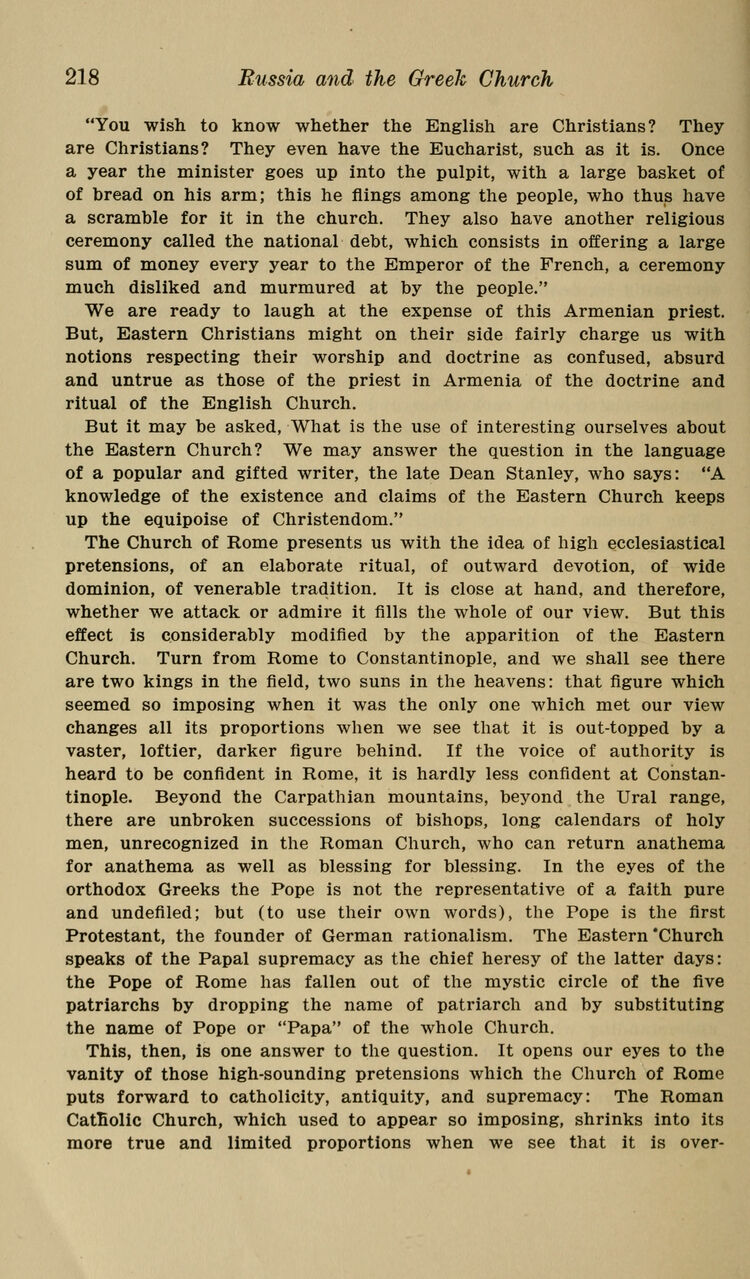
Full resolution (JPEG) - On this page / på denna sida - Russia and the Greek Church. The Rev. Elias Newman - I. The Greek Church—Its Peculiarities

<< prev. page << föreg. sida << >> nästa sida >> next page >>
Below is the raw OCR text
from the above scanned image.
Do you see an error? Proofread the page now!
Här nedan syns maskintolkade texten från faksimilbilden ovan.
Ser du något fel? Korrekturläs sidan nu!
This page has never been proofread. / Denna sida har aldrig korrekturlästs.
218 Russia and the Greek Church
"You wish to know whether the English are Christians? They
are Christians? They even have the Eucharist, such as it is. Once
a year the minister goes up into the pulpit, with a large basket of
of bread on his arm; this he flings among the people, who thus have
a scramble for it in the church. They also have another religious
ceremony called the national debt, which consists in offering a large
sum of money every year to the Emperor of the French, a ceremony
much disliked and murmured at by the people."
We are ready to laugh at the expense of this Armenian priest.
But, Eastern Christians might on their side fairly charge us with
notions respecting their worship and doctrine as confused, absurd
and untrue as those of the priest in Armenia of the doctrine and
ritual of the English Church.
But it may be asked, What is the use of interesting ourselves about
the Eastern Church? We may answer the question in the language
of a popular and gifted writer, the late Dean Stanley, who says: "A
knowledge of the existence and claims of the Eastern Church keeps
up the equipoise of Christendom."
The Church of Rome presents us with the idea of high ecclesiastical
pretensions, of an elaborate ritual, of outward devotion, of wide
dominion, of venerable tradition. It is close at hand, and therefore,
whether we attack or admire it fills the whole of our view. But this
effect is considerably modified by the apparition of the Eastern
Church. Turn from Rome to Constantinople, and we shall see there
are two kings in the field, two suns in the heavens: that figure which
seemed so imposing when it was the only one which met our view
changes all its proportions when we see that it is out-topped by a
vaster, loftier, darker figure behind. If the voice of authority is
heard to be confident in Rome, it is hardly less confident at Constan-
tinople. Beyond the Carpathian mountains, beyond the Ural range,
there are unbroken successions of bishops, long calendars of holy
men, unrecognized in the Roman Church, who can return anathema
for anathema as well as blessing for blessing. In the eyes of the
orthodox Greeks the Pope is not the representative of a faith pure
and undefiled; but (to use their own words), the Pope is the first
Protestant, the founder of German rationalism. The Eastern ’Church
speaks of the Papal supremacy as the chief heresy of the latter days:
the Pope of Rome has fallen out of the mystic circle of the five
patriarchs by dropping the name of patriarch and by substituting
the name of Pope or "Papa" of the whole Church.
This, then, is one answer to the question. It opens our eyes to the
vanity of those high-sounding pretensions which the Church of Rome
puts forward to catholicity, antiquity, and supremacy: The Roman
CatBolic Church, which used to appear so imposing, shrinks into its
more true and limited proportions when we see that it is over-
<< prev. page << föreg. sida << >> nästa sida >> next page >>